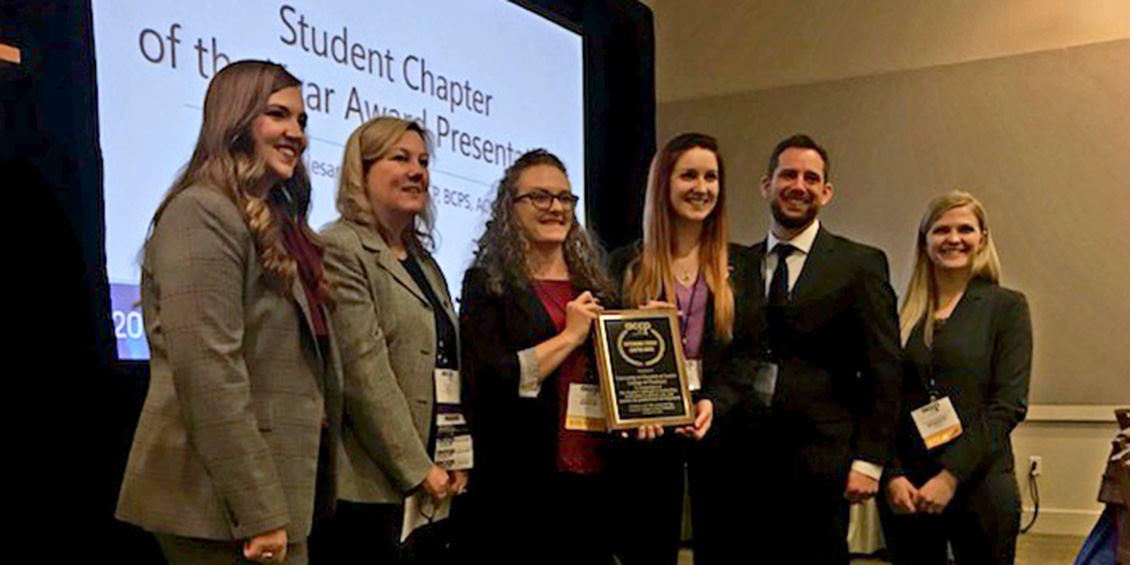Student News

Creativity, Nontraditional Practice Exposure Pays Off for SCCP
UHCOP Organization Wins Outstanding Student Chapter Award from American College of Clinical Pharmacy Only 4 Years from Founding
The UH College of Pharmacy Chapter of the Student College of Clinical Pharmacy (SCCP) has taken the national title as the 2018 Outstanding Student Chapter by its parent organization, the American College of Clinical Pharmacy (ACCP).
Marking its first national title only four years after forming, the UHCOP SCCP Chapter was recognized with a plaque and a $1,000 check during the Student Chapter Forum at ACCP's 2018 Global Conference on Clinical Pharmacy Oct. 20-23 in Seattle, Wash. In addition, chapter member Goran Flajc was recognized as the UHCOP Chapter's Outstanding Student Chapter Member Award recipient.
"Our chapter tries to offer programs with tangible benefits that are useful to them as students and as future clinical pharmacists, such as getting certified to educate patients about hepatitis C and perform oral swab screening for the disease," said current president Katie Rascon, a third-year Pharm.D. student who was president-elect during the award-winning year.
One of the organization's major new initiatives last year was hosting an Opioid Overdoes Prevent & Naloxone Training Seminar in response to a Texas statewide standing order that expanded pharmacists' ability to dispense and even administer the fast-acting opioid-reversal drug naloxone (narcan) without a prescription. The order also allows the opioid antagonist to family members or friends of those at risk for opioid overdose.
More than 70 UHCOP students underwent the training and received a donation of 20 naloxone kits, which the students then passed on to area high schools and outpatient substance abuse treatment centers after training students and staff members on overdose prevent and response education. The naloxone training was one example of "out-of-the-ordinary" programs for which the chapter has developed a reputation, said Pharm.D. candidate and immediate past president Anna Cantwell.
"We put a lot of effort into exploring relevant topics to supplement the student's exposure to experiences students may encounter outside of the traditional curriculum because we think the early exposure will better prepare them if and when that day comes, as well as get everyone thinking about how changes in the law affect your pharmacy practice," Cantwell said. "We believe it's important to incorporate topics such as our past workshops on the pharmacist's role in medicinal marijuana and physician-assisted suicide.
"Although pharmacy graduates may not encounter these situations immediately or ever in Texas, some graduates may move to a state – even if only for a year or two while completing residencies – where those situations are part of the practice experience."
Cantwell added that the organization also is unique in separating many of its meetings and programming for first- and second-year students and third- and fourth-year students.
"Our programs for earlier students focuses a lot on topics to help the students better prepare for important steps in the curriculum, such as our OSCE (Objective Standardized Clinical Examination) Preparation Course, 'A Day in the Life of a Pharmacist' series that gives a glimpse of working in clinical specialities or settings, our networking workshop, and tutorial sessions," she said. "Our meetings for P3s and P4s were geared more toward easing the transition into their responsibilities during fourth-year rotations, such as drug monograph presentations, case presentations and journal clubs."
In the nine health fairs in which the chapter participated during the 2017-18 academic year, members provided free wellness screenings ranging from blood glucose and cholesterol screenings, diabetic foot exams and medication reconciliations to seasonal flu immunizations for more than 400 patients. The events most often targeted medically underserved communities as well as an interprofessional collaboration with medical, optometry, nursing, chiropractic or dental students from fellow Texas Medical Center institutions.
Yet, it wasn't "all work and no play" for the chapter in 2017-18. The chapter also hosted a Jeopardy-style competition for pharmacy, dental, physician assistant and social work students as well as a Spelling Bee for UHCOP students and faculty.
"During the spring semester, students are more stressed, so we wanted to do some things to kind of give everyone a break, but still with an opportunity to learn about other professional programs or reinforce topics," Cantwell said.